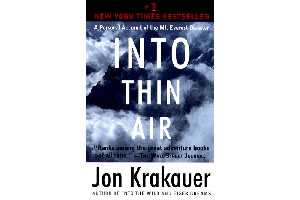Did you actually read “Into Thin Air”?
The honest response to this popular first week of school question was typically a negative one, excluding freshmen who hadn’t experienced a summer reading assignment and took it seriously, unlike many upperclassmen. Disinterest in summer reading novels is common, but if the administration wants to see a change, then change has to be made.
Although most JC students aren’t fans of reading, the administration should take into account that interest would be sparked if summer reading novels were chosen by the students. We students know what we want and what interests us, “Into Thin Air,” was not it.
For instance, having read “Into the Wild,” a story with the same tone by Jon Krakauer, I didn’t have high hopes for “Into Thin Air.” My instincts were right. Not only was the book boring, but it was also a total downer. Krakauer begins at the top of the world, and he was just as excited about it as I was to keep reading. I personally couldn’t relate to a book that takes place on Mount Everest while enjoying my hot summer.
Both students and teachers questioned each other about whether or not they read the book. Religion teacher Rachel Harkins asked many of her Church History classes that question, receiving “disappointing” results. “There was probably one out of five students who read it,” Harkins said.
The Foreign Language Department and Jesse Roberts, however, gets major points for booking Paul Deegan. The presentation given by him was much more interesting than the novel itself. Even though he was not in the direct line of the storm that takes place in “Into Thin Air,” I would have rather read a book about his life experiences and his battles with Mount Everest. Any background information he gave applied to the message he was trying to get across. He understood that his audience was a group of teenagers with short attention spans that are probably unable to connect with Mount Everest.
Therein lays the problem with “Into Thin Air.” A summer reading book should be somewhat interesting, and it would make more sense if students had a say in what they had to read.
The administration sends out polls all of the time, a simple school wide poll would produce better results. By giving out a list of options of approved books to choose from, the administration would still have a choice in the books chosen and students would have a more hands on approach which would produce more interest in summer reading.
Reading a book of their own choice will more than likely change the majority of responses to that inevitable question on the first day of school.
When students are interested in what they are reading and they can relate to the subject of the story, they will actually read it. If JC is going to require a summer reading book, it might as well be a book that the students select.
Chioma Iheoma is an A&E editor for The Patriot and jcpatriot.com.



